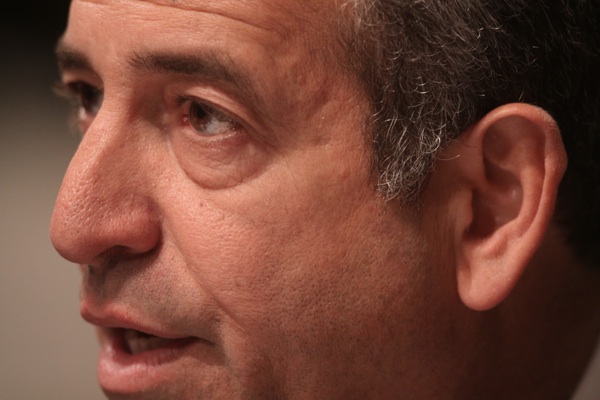Feingold Set to Oppose Further Troop Boost for Afghanistan
Progressives who oppose escalation see an opportunity to change the public debate.
Jul 31, 202064.2K Shares1.1M Views
Sen. Russ Feingold (D-Wis.) (WDCpix)
If Gen. Stanley McChrystal proposes, as expected, an increase in U.S. troops for the Afghanistan war, Sen. Russ Feingold (D-Wis.) is “likely to oppose it,” the senator told TWI.
Feingold’s opposition to what would be the second U.S. troop increase in Afghanistan this year is the most forceful Senate dissent so far to a war that President Obama has embraced. It represents a preemptive warning to both Obama and to McChrystal, the new commander of U.S. and NATO forces in Afghanistan, who is scheduled to give the Pentagon an assessment of what additional resources he requires for the war next week. And it highlights what some progressives also opposed to escalation see as an opportunity this summer to change public debate about the eight-year war.
Illustration by: Matt Mahurin
“I don’t think the case has been effectively made for continuing to send more and more troops into Afghanistan,” Feingold said in a Wednesday interview. “I am very unhappy with the answers I’ve received about the issue of whether constantly increasing troops is helping the situation in Pakistan or making it worse. I suspect it could be making things worse.” Feingold fears that increasing troops in Afghanistan might lead insurgents to cross the border into Pakistan, which is engaged in its own fight against a distinct but affiliated insurgency, and he told The Nation magazine’s Jeremy Scahill recentlythat the administration has yet to address that concern.
Next week, McChrystal will present to Defense Secretary Robert Gates and NATO Secretary General Anders Fogh Rasmussen the results of a review compiled for him by a team of about a dozen outside advisersof what changes in tactics, emphasis and resources are necessary to reverse a deteriorating situation. At least one of those advisers, Anthony Cordesman of the Center for Strategic and International Studies, statedlast week that “Bloomberg News reportedWednesday that McChrystal may defer a decision on additional troops for several more weeks.
As part of a campaign promise to refocus on a neglected war in Afghanistan, President Obama ordered troop levels increased in March by 17,000 combat forces, along with 4,000 troops to train and advise Afghan soldiers and police, and the new forces are scheduled to be in place by next month. Senior administration officials have expressed concern over a second troop increase this year. Reportedly, Jim Jones, the national security adviser, toldMcChrystal and his deputies that any such request would not be welcomed by Obama. In January, Gates tolda Senate panel that he would be “very skeptical” of a troop increase much over what Obama ultimately approved.
Obama stated in March that the goal of the troop increase and a new intertwined civil-military strategy for both Pakistan and Afghanistan was to “disrupt, dismantle and defeat” al-Qaeda. Yet at his June confirmation hearing, McChrystal saidlittle about al-Qaeda, and pledged to adopt what he called a “classic counterinsurgency” strategy of protecting the Afghan population from insurgent attacks to eventually deny the Taliban-led “syndicate” of insurgent groups — some of whom have marginal ties to al-Qaeda — popular support. Interviews granted by McChrystal and his deputiessince arriving in Afghanistan have occasionally downplayed the counterterrorism goals of the strategy, with one anonymous official telling the Los Angeles Times’s Julian Barnes, “We have been overly counter-terrorism-focused.” Feingold said that he was “a little worried” that McChrystal’s focus for the war is “much broader” than Obama’s.
“I’m a little worried that it’s ‘Let’s do the surge again, like we did in Iraq and it’ll all work out fine,’” Feingold said. “It strikes me as not fairly in tune with the history of Afghanistan and the geopolitics of the region. I’m willing to listen and I’m willing to give the general a chance to articulate it and maybe it’ll improve. But it strikes me as ‘Let’s just keep sending more troops in and see what we’ll do with them after they get there,’ rather than having a clear vision of what the real goals are.”
So far, opposition to Obama’s Afghanistan plans have yet to coalesce in the Senate. While some members of the House have raised doubts about sending additional troops to Afghanistan — a March 16 letter signed by 14 representatives urged Obama to “reconsider” his troop increases and “resist pressure to escalate even further” — discussion in the Senate has mostly centered around Armed Services Committee members querying Pentagon officials about whether they have sufficient resources for the war. Sen. Bernie Sanders (I-Vt.) took a lonely position against Obama’s initial escalation. But Feingold said he was beginning to hear discontent from senators of both parties, particularly as the 40 U.S. troop deaths last monthmade July the deadliest month of the war for the U.S. to date.
“A nervousness has developed, not only among Democrats, but Republicans as well,” Feingold said. While he said he couldn’t “put a number” on how many of his colleagues share that concern, he added, “I’m hearing more and more misgivings at this point. One thing I’m hearing from some of the Republicans is that they know very well that even if you believe that the surge was the key in Iraq [to reduced violence], that this isn’t the same situation.”
Some war opponents see signs of that nervousness around the country; a CBS/New York Times poll last week found57 percent of respondents believing the war was going badly. Members of Get Afghanistan Right— a coalition of progressive writers, bloggers, filmmakers and activists that launched a websiteto forestall the Obama administration’s plans to increase troops in Afghanistan — are looking to the next several months as a key period for public discussion of an expanded war. One coalition member, the filmmaker Robert Greenwald, plans to screen a film he’s put together from Afghanistan in key congressional districts during August to pressure lawmakers to come out against the war. “There’s a huge opportunity for elected officials to take a leadership role here,” Greenwald said.
Greenwald’s Brave New Films launched a project earlier this year called Rethink Afghanistan, which presents a series of short online videos about the financial and human costs of the war and urges viewers to take action. The current installment, a video about the plight of women in Afghanistan, is paired with a donation tool allowing readers to get involved. In advance of a scheduled October theatrical premiere for the entire film, portions of it will be screened at events in districts of select members of Congress, and discussions of the war will be led by a new group of Afghanistan veterans, called Rethink Afghanistan Veterans, that the project has brought together.
“The reality is this is not a problem that can be solved with a military solution, and most politicians haven’t been there or don’t really recognize the problems,” said Jake Diliberto, a member of Rethink Afghanistan Veterans who deployed to Afghanistan in 2001 with the 26th Marine Expeditionary Unit. So far, the group has held film screenings or Afghanistan-related meetings in the districts of Maxine Waters (D-Calif.) and Laura Richardson (D-Calif.). Next comes the northern California district of Rep. Mike Thompson (D-Calif.) on August 9 and 18; the districts of Mike Michaud (D-Maine) on August 26 and Chellie Pingree (D-Maine) on August 28; and hawkish Rep. Jane Harman (D-Calif.) on Sept. 3.
“Some folks on the left, the far left, are fairly divided. Waters and [Rep.] Jim McGovern (D-Mass.) think a military solution is not feasible,” Diliberto said. “But there are others like Nancy Pelosi who will support the president till the ships get buried at the bottom of the ocean.”
Alex Thurston, a blogger at The Seminalwho plays a leading role with Get Afghanistan Right, said his individual efforts in the coming weeks would “focus simply on keeping Afghanistan on people’s radar,” and working to prevent Afghanistan from being overshadowed by domestic debates. He and Brave New Films plan to sponsor a blogger specifically to cover Afghanistan. “I believe that when Americans sit down and really reflect, on an informed basis, about how things are going in Afghanistan, they will increasingly oppose troop escalations,” Thurston said in an email.
(Full disclosure: The Seminal is hosted by the same blog network as my personal blog, and Greenwald and I will speak on a panel on Afghanistan policy at the Netroots Nation conventionnext week.)
Feingold agreed that domestic worries like health care and the economy have “almost drowned out” Afghanistan. But after attending some recent constituent meetings in Wisconsin, he said, concern was “starting” to develop. “As usual,” Feingold said, “the people are ahead of Washington and the politicians.”

Rhyley Carney
Reviewer
Latest Articles
Popular Articles

